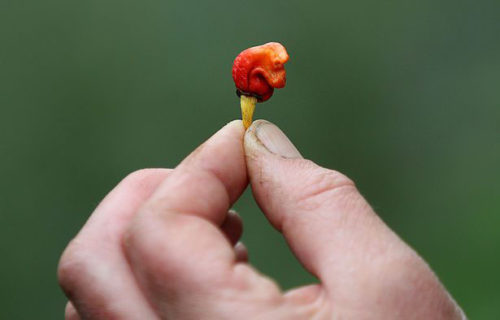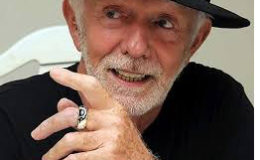
Chilli-heads, hot mouths and Dragon’s Breath
With a slight pebbly surface, diminutive size and deep orange, red and yellow folds, the latest member of horticultural royalty seems to hardly deserve a second glance.

With a slight pebbly surface, diminutive size and deep orange, red and yellow folds, the latest member of horticultural royalty seems to hardly deserve a second glance.
The famous Dutch surrealist Hieronymus Bosch, “the creator of devils,” left behind only a small but genius body of deeply original work crammed with disturbing symbolism.

The touching tableau of six slender bronze statues with their simple ship bundles, envisioned by two of Guyana’s leading artists should have been standing in all of its shining glory a week ago to commemorate the historic May 5 1838 arrival of the first East Indian indentured immigrants.

With patches of rust scattered along the dull maroon waterline, ugly streaks on the small white cabin, and paint flaking off its faded black hull, the fishing trawler seemed a most unremarkable, dingy vessel that for years, slouched low in the open at its mooring, next to the stone walled ruins of the Curacao Trading Company complex.
Glance at any map of the Caribbean and one cannot but notice the distinctive arc of the small islands elegantly sweeping the blue sea.
The Tsimane or Chimane people are an isolated, indigenous tribe who maintain their tough, subsistence traditions in a remote area of Bolivia’s Amazonian lowlands, faithfully foraging and farming in small, rural settlements along the Maniqui River, like their ancient ancestors.
As the April sunshine blazed and the days grew drier, the boisterous north east trade winds swept in from the restless Atlantic and our schools closed with a sigh in a tired haze of dust.
For most of my early Guyana life, suckers were merely the plain, pointed side shoots that perennially popped up in a clump around the pseudostem of the banana and plantain trees which towered in many crowded backyards, providing cool green shade and sweet, filling provision.
As children, we dreaded the regular cathartic “clean-outs” our determined parents deemed necessary for holistic health and harmony.
The Greek classical scholar, Aristophanes of Byzantium, is hailed as the patient father of punctuation for his pioneering efforts to sort out the complex comprehension and proper pronunciation of his native language 2200 years ago.
One fine Sunday evening, three months ago, Sri Lankan carolling churchgoers were stunned into sudden silence when they eagerly picked up their Christmas music sheets at one of the country’s biggest Catholic services, in preparation for reciting a beloved prayer.

Packets of vivid powders would lie on the kitchen table like scattered pieces pulled from a pretty patchwork quilt.

Gaping mouths and ghastly sockets scream silently of nothingness, as the phantom heads float high, trailing suckered tentacles in all ghostly white swathes, sardonic symbols of a post-apocalyptic grim world titled “Sailors on an Exotic Isle.”

“Absolute power corrupts absolutely” is the famous quotation used by English Catholic peer John Dalberg-Acton, Lord Acton in an 1887 letter opposing the move to promulgate the doctrine of Papal infallibility.
The Mighty Sparrow complained bitterly “it’s a shame, it’s a shame” in his classic composition “Pay As You Earn (P.A.Y.E)”
As a young child, I loved accompanying my stout father, “Mr.
Less than a fortnight ago, the new United States leader publicly repeated a startling phrase that had become common enough during his blunt and divisive campaign to reach the White House.
American journalist Steve Coll describes an illuminating exchange in 2001 between then President George Walker Bush and the Indian Prime Minister Atal Bihari Vajpayee.

A slim, greenish brown band in a layer of clay clearly separates two key geologic eras all over the world, showing abnormally high microscopic concentrations of iridium, a rare dense, brittle element that best resists corrosion and bears a beautiful silvery burnish.
The Little Guyana strip of Queens, New York runs for about 25 vivid blocks, with the thriving storefronts a feast of wild colours, bustling with immigrants sporting a range of distinctive musical accents that mark their origins in faraway tropical villages with rather strange names ranging from Ankerville to Zeelugt.
The ePaper edition, on the Web & in stores for Android, iPhone & iPad.
Included free with your web subscription. Learn more.